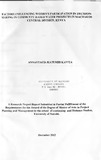| dc.description.abstract | The participation of women in decision-making positions in sub-Saharan Africa is still very low. This is despite their contribution in their households, food production systems and national economies. This can be attributed to various factors influencing the participation of women in decision-making such as demographic factors, educational factors, cultural factors, economic factors and women's natural abilities This study sought to establish the influence of these factors on the participation of women in decision-making with the study area as Machakos central division in Machakos County. The research study used the descriptive study design, which employed both the qualitative and quantitative methods. The target population of the study was composed of two categories namely the committee members and the beneficiaries.
The study employed simple random sampling technique to select the sample. Sample size was 50 selected from a target population of 128.Two sets of questionnaires were developed; one for the committee members and another for the and the other for the beneficiaries. The study concludes that demographic factors such as age , gender and marital status influence the participation of women in decision-making. School attendance by girls at primary school level is very good, but it decreases as they move up the academic ladder. This in turn means that they do not possess the skills necessary for them to participate in decision-making.
Girls also marry at the tender age of between 16-25, a factor that affects their schooling. Property ownership by girls and women is very low and in most cases non-existent, they mostly own small scale enterprisers and have poor access to credit facilities. This means that they can therefore not access self-improving facilities due to poverty. Women possess natural abilities which can improve the quality of decisions they make. The study recommends that the government should look into the education of girls. Retrogressive Cultural practices should be done away with. Policies which encourage gender equity in education and property ownership should be adopted. | en_US |

